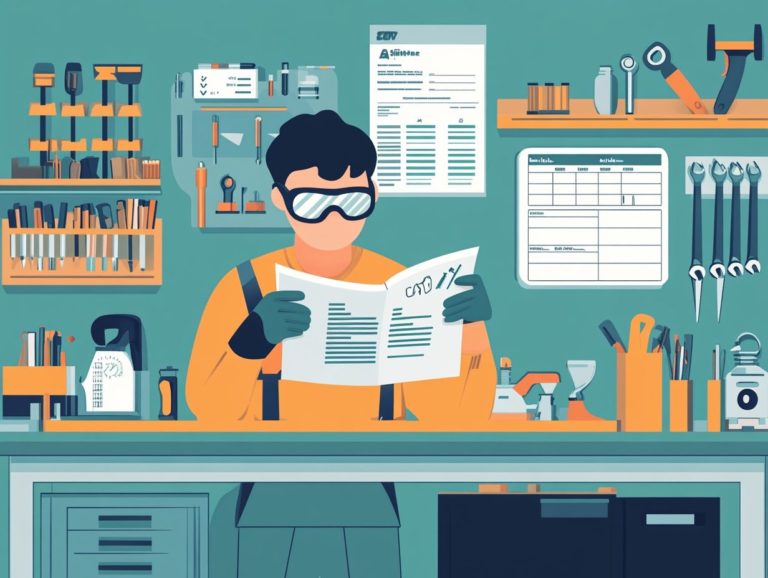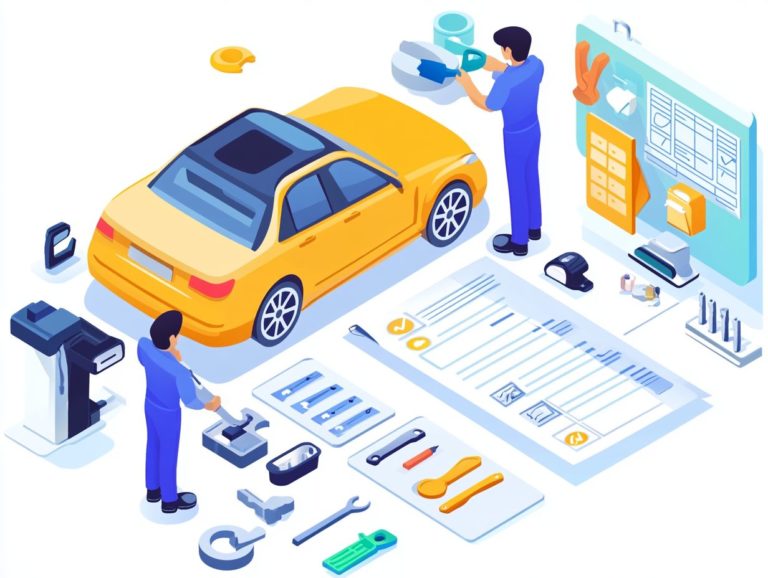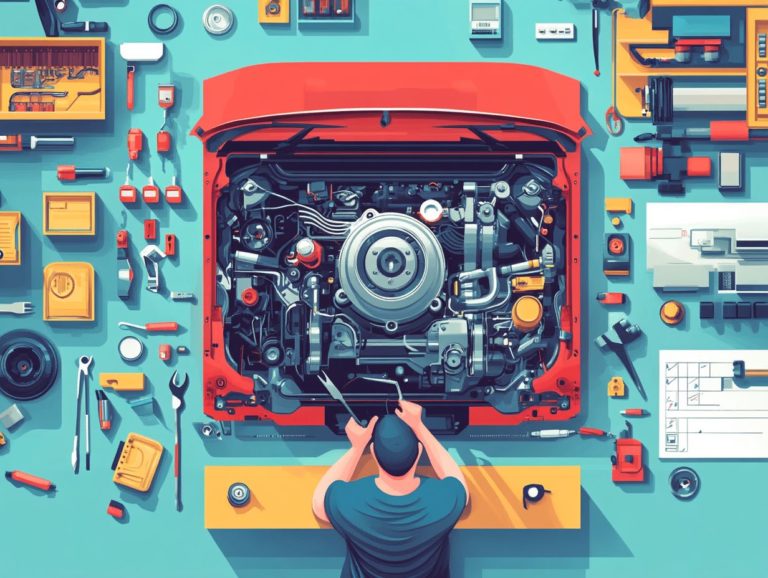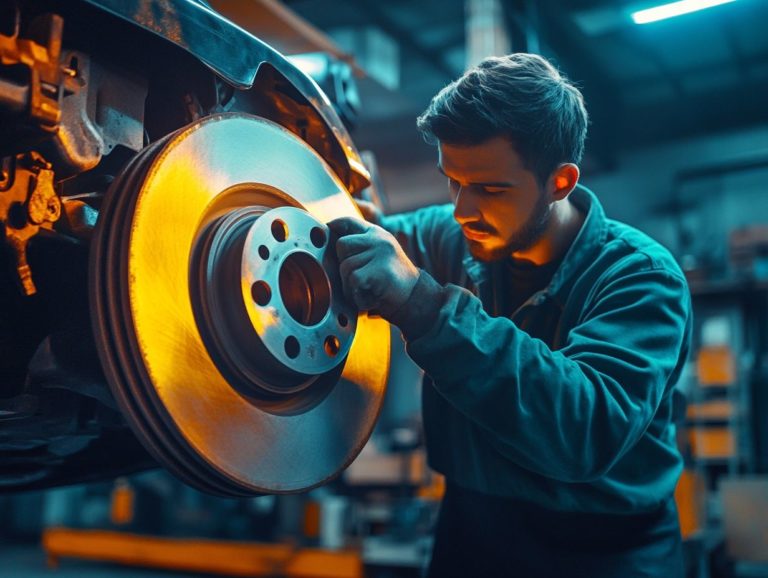How to Maintain Your Car’s Exhaust System
The exhaust system of your car is pivotal to its performance and efficiency. Yet, it frequently remains underappreciated until issues emerge.
To ensure your vehicle operates seamlessly, it’s vital to understand its components and functions. This article delves into recognizing the signs of a failing exhaust system and provides practical maintenance tips. It also weighs the pros and cons of DIY versus professional care.
This article also examines the costs of maintaining your exhaust system. This knowledge helps you make informed choices that keep your car in prime condition.
Contents
- Key Takeaways:
- Understanding Your Car’s Exhaust System
- Signs of a Failing Exhaust System
- Maintenance Tips for Your Exhaust System
- DIY vs Professional Maintenance
- Pros and Cons of Each Option
- Costs Associated with Exhaust System Maintenance
- Factors to Consider and Budgeting Tips
- Frequently Asked Questions
- What is the purpose of maintaining your car’s exhaust system?
- How often should I have my exhaust system inspected?
- What are some signs that my car’s exhaust system needs maintenance?
- Can I perform maintenance on my car’s exhaust system myself?
- How can I prolong the life of my car’s exhaust system?
- What should I do if my car’s exhaust system is emitting a strange odor?
Key Takeaways:

- Regular inspection and cleaning are crucial in maintaining your car’s exhaust system. Look out for common warning signs such as loud noises or decreased fuel efficiency.
- Replacing worn-out exhaust system components is necessary to prevent further damage and ensure proper functioning. Consider both DIY and professional options, weighing the pros and cons of each.
- Budgeting for exhaust system maintenance is important as costs can vary based on factors such as the type of car and the extent of damage. Be proactive in maintaining your exhaust system to avoid costly repairs in the future.
Understanding Your Car’s Exhaust System
Understanding your car’s exhaust system is essential for maintaining best performance and meeting emissions regulations. Did you know your exhaust system channels harmful combustion gases away from the engine? This keeps your car running smoothly while reducing emissions, which directly influences fuel efficiency, engine performance, and overall vehicle upkeep.
Important components, such as the muffler, catalytic converter, and oxygen sensors, are crucial in ensuring the exhaust system functions properly. Neglecting these can lead to issues like excessive vibrations, unusual noises, and pesky check engine light warnings.
By conducting regular visual inspections and seeking professional assistance when needed, you can avoid costly exhaust repairs. This will elevate your driving experience.
Components and Functions
The exhaust system is a sophisticated assembly of components. It includes the exhaust manifold, exhaust pipe, catalytic converter, oxygen sensors, and muffler, each serving a crucial role in your vehicle’s performance.
These elements work together seamlessly to manage the combustion gases produced during your engine’s operation. The exhaust manifold collects these gases from the engine cylinders and directs them into the exhaust pipe. This ensures a smooth flow away from the engine.
The catalytic converter is essential for reducing harmful emissions. It chemically converts pollutants into less harmful substances before they exit your vehicle.
Oxygen sensors monitor the exhaust gases to fine-tune the fuel-air mixture. This ultimately enhances fuel efficiency and overall engine performance. Meanwhile, a well-functioning muffler keeps the noise levels in check and maintains the right back pressure for optimal engine operation.
Using low-quality parts can lead to performance issues, such as increased emissions and decreased fuel efficiency. This highlights the significance of investing in high-quality components for your vehicle’s maintenance.
Signs of a Failing Exhaust System
Recognizing the signs of a failing exhaust system is vital for maintaining your vehicle s best engine performance and ensuring you comply with emissions regulations.
Keep an ear out for any unusual noises emanating from the exhaust. Pay attention to excessive vibrations while driving, and don’t ignore the check engine light glowing ominously on your dashboard.
If you notice contaminated exhaust, act fast! It could mean damaged components or an emissions issue.
Common Warning Signs

Common warning signs of an exhaust system failure include:
- Unusual noises like hissing or rattling
- Excessive vibrations
- Smoke odors wafting from the tailpipe
These symptoms can indicate problems such as leaks or blockages within the exhaust system. These issues may lead to inadequate emissions reduction and diminished engine performance. For example, if you hear hissing sounds, it might suggest a crack or hole in the exhaust pipes, allowing harmful gases to escape prematurely. Similarly, excessive vibrations could be a sign of loose mounts or damaged components that require immediate attention.
If you notice unusual smoke odors, this can point to burnt oil or fuel entering the exhaust. Both can compromise efficiency while posing significant environmental hazards. Regular visual inspections are essential for catching these warning signs early on.
Addressing these issues promptly not only prevents further damage but also ensures compliance with emission standards. This ultimately safeguards your investment and contributes to cleaner air initiatives.
Maintenance Tips for Your Exhaust System
Keep your exhaust system in top shape to ensure a powerful and fuel-efficient ride! Regular maintenance is essential for achieving optimal engine performance and boosting fuel efficiency. To enhance this, learn how to maintain your car’s fuel system effectively, which can help prevent rust and corrosion by incorporating routine inspections and using high-quality cleaning products.
Be proactive about replacing worn-out parts, like the muffler and catalytic converter, to sidestep more significant issues in the future while ensuring compliance with emissions standards.
Regular Inspection and Cleaning
Conducting regular inspections and cleaning of your vehicle’s exhaust system enhances both performance and longevity, just as knowing how to maintain your car’s cooling system is crucial for overall vehicle health.
Incorporate well-structured routine checks into your maintenance schedule to easily spot visible signs of wear, like cracks, rust, or loose fittings. Examine the entire system pipes and mufflers included for any buildup of carbon deposits or contaminants that could hinder airflow.
Using high-quality cleaning products specifically designed for this task ensures harmful substances are effectively eliminated, minimizing the risk of rust and corrosion. These practices boost the efficiency of your exhaust system and promote the overall health of your vehicle, leading to improved fuel economy and reduced emissions in the long run.
Replacing Worn-Out Parts
Replacing worn-out parts like the muffler and catalytic converter is crucial for maintaining your exhaust system’s health and ensuring you meet emissions standards.
Recognizing the signs that indicate a need for replacement, such as unusual noises, decreased fuel efficiency, or visible rust, can save you both time and money. When it s time for a muffler replacement, the process generally involves:
- Elevating your vehicle
- Carefully removing the old muffler
- Securely installing a new, high-quality component
Choosing premium parts not only boosts your vehicle s performance but also prevents further damage to the exhaust system, helping you avoid more expensive repairs in the future. Addressing these issues promptly ensures your vehicle operates smoothly and lasts longer, contributing to a more efficient and eco-friendly driving experience.
DIY vs Professional Maintenance

When considering exhaust system maintenance, the decision between tackling it yourself or enlisting professional assistance can profoundly influence your vehicle’s performance and lifespan.
While DIY repairs might be appealing for their cost-saving potential and satisfaction, they require a thorough understanding of automotive needs and maintenance protocols to prevent unintended complications.
On the other hand, seeking the guidance of an automotive technician brings a wealth of expertise in exhaust repairs. This ensures that any issues are precisely diagnosed and resolved with top-quality components.
Don t wait! Schedule your exhaust system inspection today for a smoother ride!
Pros and Cons of Each Option
Exploring the pros and cons of DIY maintenance versus professional help is crucial for making informed decisions about your exhaust system.
As a vehicle owner, you may find yourself at a crossroads: should you tackle repairs on your own or turn to a skilled mechanic? On one hand, the appeal of saving money and the personal satisfaction from completing a task independently can be incredibly rewarding. However, these benefits need to be weighed against potential pitfalls, such as the lack of specialized knowledge or tools, which could lead to below standards repairs.
It’s essential to consider how each option fits into your vehicle’s maintenance schedule. While DIY repairs might offer immediate savings, they could jeopardize your vehicle s reliability if not done correctly. Conversely, professional assistance guarantees a level of expertise that can significantly enhance your vehicle’s performance, often preventing costly issues down the road.
Costs Associated with Exhaust System Maintenance
Understanding the costs associated with exhaust system maintenance is essential for budgeting and planning your automotive needs. Several factors play a role in determining the overall expenses you might encounter, such as the type of repairs required, the quality of parts you choose, and whether you decide to tackle the work yourself or bring in a professional.
By budgeting for regular inspections and potential repairs, you can shield yourself from unexpected costs, ensuring your vehicle stays in peak condition and meets emissions standards.
Factors to Consider and Budgeting Tips
When budgeting for exhaust system maintenance, several factors should be considered to ensure your vehicle receives comprehensive care.
The age of your vehicle is a critical element; older cars often experience more wear and tear on exhaust components, leading to costly repairs down the line. Consider your driving conditions: frequent short trips or exposure to harsh weather can exacerbate wear and tear. The type of exhaust components in your vehicle, such as devices that reduce harmful gases from the engine or mufflers, also deserves closer scrutiny, as their longevity and replacement costs can vary significantly.
To avoid financial strain, it’s prudent to establish a dedicated savings plan. Allocate a small portion of your income each month specifically for regular inspections and unexpected repairs. This way, you can ensure that funds are readily available when the need arises.
Frequently Asked Questions
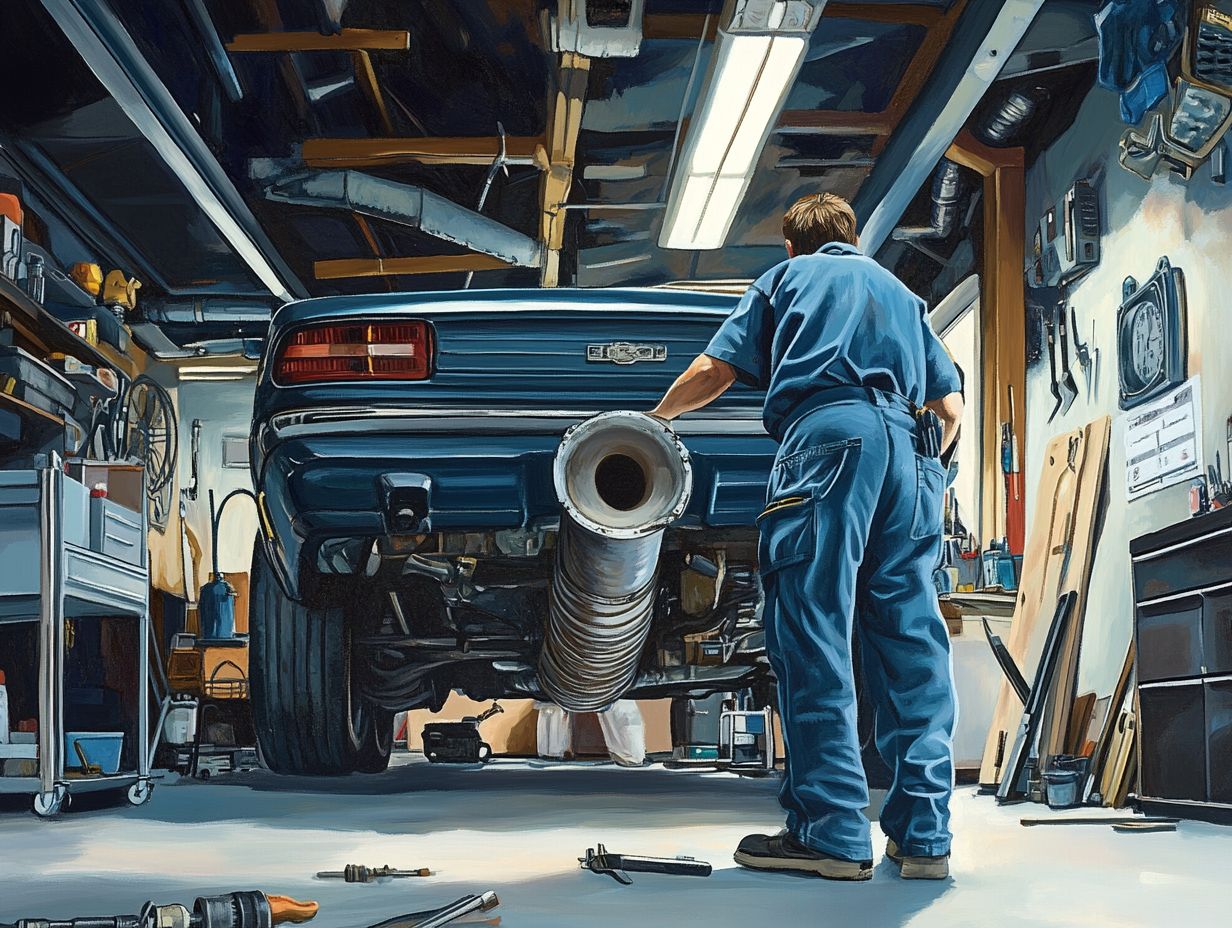
What is the purpose of maintaining your car’s exhaust system?
Maintaining your car’s exhaust system helps ensure that your vehicle runs smoothly, reduces harmful emissions, and extends the life of your engine.
How often should I have my exhaust system inspected?
Get your exhaust inspected yearly or every 15,000 miles to avoid surprises. If you notice any unusual noises or smells, it may need to be checked sooner.
What are some signs that my car’s exhaust system needs maintenance?
Signs that your car’s exhaust system may need maintenance include loud noises, decreased fuel efficiency, and visible damage like rust or holes in the exhaust pipes.
Can I perform maintenance on my car’s exhaust system myself?
While basic tasks such as checking for leaks or tightening loose bolts can be done at home, it’s best to have a professional mechanic inspect and repair your exhaust system to ensure it’s done properly.
How can I prolong the life of my car’s exhaust system?
Regular maintenance, such as replacing worn-out components and using high-quality fuel and engine oil, can help prolong the life of your car’s exhaust system. For more tips, check out how to maintain your car’s fuel system. Avoiding harsh driving habits and driving on rough terrain can also help.
What should I do if my car’s exhaust system is emitting a strange odor?
If you notice a strange odor coming from your car’s exhaust, it could indicate a leak or other issue. Have it inspected by a professional mechanic to determine the cause and prevent potential safety hazards.
Don’t wait until it’s too late! Regular maintenance can save you money and headaches.

